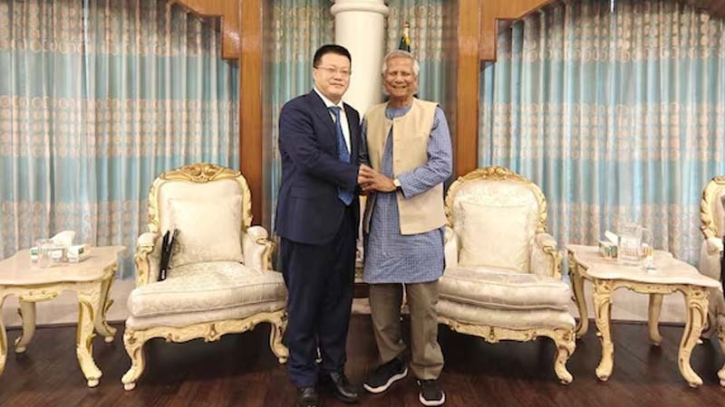Evolving Dhaka-Beijing Ties under Changing Political Dynamics in Bangladesh

The friendship between Bangladesh and China has a rich history that spans over a millennium. Both nations have long been upholding each other’s respective core interests and concerns. While China supports Bangladesh in safeguarding national sovereignty, and territorial integrity and opposing external interference, Bangladesh firmly pursues the one-China principle and appreciates China’s important role in promoting regional peace and stability.
Based on mutual trust and win-win cooperation, both nations have cultivated a robust partnership in the fields of trade, economy, security, and public diplomacy. Apart from being a top trading partner, China, the world’s 2nd largest economy, has emerged as a time-tested ally of Bangladesh. No matter the crisis—economic, humanitarian, or health—China is always ready to support Bangladesh with aid, technology, and expertise. For example, during the COVID-19 pandemic when India failed to supply vaccines to Bangladesh, China responded swiftly with medical aid, including vaccines, demonstrating solidarity and a shared commitment to health security. In the post-pandemic economic recovery efforts and ongoing global crisis that is impacting food and energy security, China, as a responsible partner, has also been playing a pivotal role in bolstering Bangladesh’s economic landscape.
Following the formation of the interim government headed by Prof. Muhammad Yunus, China reaffirmed its commitment to greater development of China-Bangladesh relations based on the Five Principles of Peaceful Coexistence and promised to collaborate with Dhaka to strengthen exchanges and cooperation in a variety of areas, advancing the two countries’ comprehensive strategic cooperative partnership. China has provided the majority of foreign direct investment (more than $85 million) since the establishment of the interim administration, indicating China’s confidence in Bangladesh’s future growth. Similarly, Bangladesh has consistently shown its interest to deepen its mutually beneficial cooperation with China. Speaking at a seminar titled “Bangladesh-China Relations: A Future Outlook’, Foreign Adviser Md. Touhid Hossain stated that Dhaka is keen to strengthen both its economic and security ties with China, as well as deepen engagements in several critical areas, such as clean energy and infrastructure development, displaying willingness to expand the cooperation.
China has always been a trustworthy partner in Bangladesh’s journey towards economic prosperity and societal well-being. In 2016, Bangladesh became the 1st South Asian country to join the BRI, China’s trillion-dollar initiative, which opened a new economic door for developing countries. Refuting the so-called “Chinese debt trap,” Bangladesh has been constructing high-quality infrastructure, such as power plants, bridges, highways, railways, and ports, in collaboration with China under BRI. While China’s loan mainly focuses on infrastructure development and energy security to deliver tangible benefits, there are some concerns regarding its higher interest rate and shorter repayment period. Bangladesh should seek sincere cooperation from China to reduce the interest rates on its loans and to extend the repayment tenure, which will greatly improve Bangladesh’s long-term debt portfolio.
Several disturbing claims have recently appeared in the media regarding China’s fund release and the volatile performance of China-backed projects. According to reports, China has halted funding for six major projects, including the Padma Bridge Rail Link and the construction of the Dhaka-Ashulia Elevated Expressway, potentially extending the project’s implementation time and cost. While China may be concerned about Bangladesh’s ability to repay its ongoing foreign debt owing to the dollar crisis, it should be noted that the ratio of Chinese loans to Bangladesh’s foreign debt is relatively low (9%), and Bangladesh’s existing financial capacity can fully afford it. Furthermore, Bangladesh has never defaulted on foreign debt repayments. It is hoped that China’s economic assistance will continue to facilitate the timely and seamless completion of the ongoing megaprojects. Again, despite the potential for long-term economic benefits, some analysts slammed the China-funded Karnaphuli Tunnel as a white elephant project. To debunk myths and maximise the tunnel’s potential, efforts should be made to construct the planned Chinese Economic and Industrial Zone (CEIZ) in Chattogram and attract investors there.
Bangladesh and China have been actively negotiating a free trade agreement (FTA), displaying their commitment to improving trade and investment relations. Recently, China has decided to provide 100 percent duty-free access to products from Bangladesh and other least-developed countries (LDCs). Given that China has the world’s largest middle-income group and the second-largest consumer market, this offer opened up enormous opportunities for Bangladeshi businesses. In 2023, China imported over $2.56 trillion worth of goods, with Bangladesh’s exports accounting for only 0.04 percent. A recent study revealed that Bangladesh can earn an additional $27 billion from exporting quality and diversified goods to China by raising its market share to 1.0 percent in the Chinese market. To tap into this market effectively, Bangladesh needs China’s cooperation in diversifying its export portfolio, which is highly focused on the garment industry, improving product standards, and formulating export promotion strategies targeted to the Chinese market. Bangladesh should also encourage Chinese firms to invest in sectors such as ceramics, leather, pharmaceuticals, electric cars, high-end clothing, and home appliances by providing tax incentives, lowering import taxes, and expediting registration procedures.
Both Bangladesh’s interim government and China prioritize a greener future. In addition to emphasizing close economic partnership, Chief Adviser Prof. Yunus urged China to relocate some of its solar panel plants to Bangladesh to improve the country’s green transition and exports. China, the world leader in renewable energy generation capacity, has made outstanding contributions to global green transformation over the last decade. In Bangladesh, challenges to clean energy transition include a lack of infrastructure and investment in renewable energy technology, the reliance on fossil fuels for electricity generation, and social and economic factors. China’s development experiences, eco-friendly measures, technology transfer, and investment in the renewable energy sector can help Bangladesh reshape its green future. Furthermore, as capital Dhaka struggles with the challenges of rapid urban expansion, China’s expertise in managing urbanization might provide valuable insights.
Another potential area for cooperation between China and Bangladesh is the healthcare sector. It is appreciable that China has sent the National Emergency Medical Team to Bangladesh to provide quality treatment to patients wounded in the recent mass uprising, underscoring China’s support for the current administration. Following the collapse of the previous government, the Indian visa crisis spells huge trouble for Bangladeshi patients who seek medical treatment in India. Many of the 7 lakh Bangladeshi medical tourists who prefer to go abroad (mostly to India, Thailand, Singapore, the US, and Malaysia) may explore the potential of China’s medical facilities. Public health specialists, however, are concerned about the surge in outbound medical tourism and believe it will continue until local healthcare facilities can gain the patient’s trust and confidence. Therefore, Bangladesh should study China’s proposed joint venture to build a state-of-the-art hospital in each district of Bangladesh, which has the potential to boost the country’s medical industry while saving around $5 billion in foreign currency each year.
Ahead of the 50th anniversary of the establishment of diplomatic relations between the two countries next year, it is expected that the Dhaka-Beijing partnership will flourish further in the next 50 years and beyond, deepening cooperation in economic, strategic, political, humanitarian, and cultural sectors. Through continued dialogue, high-level exchanges, strategic engagement, academic interaction, and mutual visits between the governments, experts, and political parties of the two countries, Bangladesh and China have the potential to establish a partnership that will serve as a model of friendship among developing countries. -Source: pressenza
.png)









